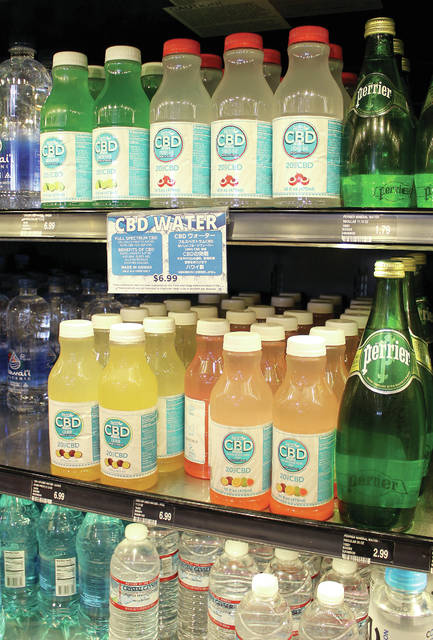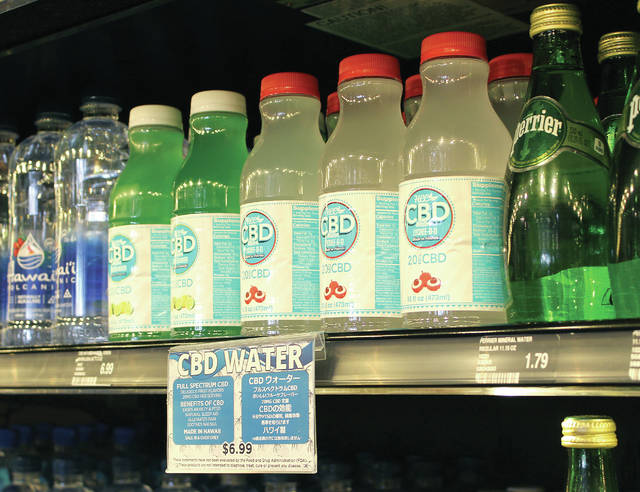DOH begins enforcement against CBD-infused products


KAILUA-KONA Cannabidiol, a naturally occurring compound in the cannabis plant more commonly known as CBD, is no longer an approved food additive in Hawaii. In fact, it never was.
KAILUA-KONA — Cannabidiol, a naturally occurring compound in the cannabis plant more commonly known as CBD, is no longer an approved food additive in Hawaii. In fact, it never was.
This, however, appears less than common knowledge among the state’s business community considering the proliferation of ingestible CBD products displayed prominently on store shelves throughout the islands.
“Permitted (vendors) are not allowed to serve adulterated foods,” said Bruce Anderson, director of the state Department of Health. “And all foods infused with CBD are considered adulterated, according to our administrative rules.”
The rules haven’t stopped permitted food establishments across Hawaii from breaking the law by selling hundreds of different products infused with CBD over recent months and years, from ice cream to gummy candies to lemonade.
But the problem isn’t a corrupt food industry. It’s that the food industry has no idea what it’s doing is illegal under state statutes.
DOH has only recently assumed the mantle of enforcement on the issue, and thus far, only to a point. It wasn’t until last month DOH began notifying businesses their practices were running afoul of the law, which has been done on a case-by-case basis only if someone files a complaint against the establishment in question.
“Since March we’ve been responding to complaints,” said Anderson, adding DOH has not initiated sweeps to check store shelves for illicit CBD products or engaged in mass communication efforts. “We haven’t been monitoring exactly how long establishments have been adding (CBD) to food products here in Hawaii, but it was likely being done before that time.”
FDA influence
The question of ‘Why now?’ can be traced at least in part to a statement issued by former Food and Drug Administration Commissioner Scott Gottlieb, M.D., on Dec. 20, 2018, after the Agriculture Improvement Act was signed into law.
DOH has adopted the FDA standard model food code for regulatory purposes, Anderson explained. The FDA isn’t “telling us what to do,” he continued, but the department does follow the federal lead.
The lengthy FDA release reaffirmed the illegality of advertising CBD products as possessing medicinal benefit, a notion that hasn’t been confirmed by laboratory testing, and contained the following language pertinent to ingestible, hemp-based CBD products sold in stores:
“Additionally, it’s unlawful under the (Federal Food, Drug, and Cosmetic) Act to introduce food containing added CBD or THC into interstate commerce, or to market CBD or THC products as, or in, dietary supplements, regardless of whether the substances are hemp-derived.”
CBD does not have the same effects as THC and on its own does not produce any type of “high” associated with the use of cannabis.
Peter Shumar, owner of Hawaiian Licks ice cream shop in Hilo, was notified on March 15 of his obligation to remove CBD-infused products from his shelves. He said he’s only aware of a few people on Hawaii Island with licenses to grow hemp, so most ingestible CBD products are being shipped to the state.
That might explain, in part, why DOH has been dormant on enforcement in the recent past, as CBD is also a relatively new food additive.
“The FDA regulates interstate transport and sale of foods,” Anderson said. “Any (CBD-infused) product coming into Hawaii from other places would be considered adulterated, and they would have the responsibility and authority to stop interstate transport of those products. It’s not clear to what extent they’re actually exercising that authority.”
Shumar added DOH officials on Hawaii Island told him out-of-state companies producing edibles labelled as dietary supplements and coming from a state where CBD is currently an approved food additive can ship to Hawaii and sell their products here legally.
Anderson said that information is incorrect.
“Let me just say flat out, (CBD) is a prescription drug and therefore it can’t be put into food or sold as a drug without a prescription,” Anderson explained. “So if they’ve listed it as a dietary supplement, that would also be illegal and subject to enforcement action.”
Such enforcement action would extend first to a cease and desist letter and potentially to permit revocation. However, Anderson said all businesses DOH has contacted have been cooperative and so far appear to have promptly complied with the mandated removal of illegal products.
Who knows?
But the problem is less compliance than it is communication at this point in the process, as most businesses still have no idea they’re breaking the law.
Taylor Holt, manager at Island Naturals Market and Deli in Kailua-Kona, said Monday he’d never heard anything about DOH designating CBD-infused products as illegal and hadn’t been contacted by any DOH personnel. The business sells CBD products labelled dietary supplements. He wasn’t sure if it offered any similar food products.
A spokesperson for ABC Stores said no one at the company’s Honolulu office was aware of pertinent DOH protocol on CBD food additives as of Monday, adding the state had not contacted ABC Stores. Among its CBD-infused products, the company offers gummies and beverages containing the compound.
Other businesses that asked not to be named have continued to sell CBD-infused products despite hearing rumors or even being contacted by a DOH official because they’re murky on what is or isn’t actually illegal.
“There’s no phase-out plan and no solid plan, I guess, as far as should (businesses) destroy the product or continue selling it,” commented Shumar, who projects to lose about 2 percent of his business after removing CBD ice cream from his cones. “There’s really no guidance from the (DOH).”
Anderson said details of enforcement protocol are a problem facing all states and are likely to change in Hawaii in coming months as the department explores the best options.
Potential problems
Anderson said guidance is forthcoming. He added if DOH was aware of any cases in Hawaii where consumption of CBD caused serious health risks that the department would pursue much more aggressively shutting down distribution lines of those products.
DOH is aware of synthetic CBD causing problems in other states, including deaths, which prompted Anderson to urge caution among the public and compliance among the business community.
“CBD is not a benign substance,” he said. “It hasn’t been well studied. That’s one of the reasons we’re concerned. We’re worried about how it’s been manufactured.”
“We have no control over it and no one else does,” continued Anderson, adding a lack of regulated manufacturing is cause for concern about both the process and the resulting CBD concentrations in finished products.
The most significant factor in the lack of studies on CBD is the U.S. Drug Enforcement Agency’s classification of cannabis as a Schedule I drug. The FDA doesn’t regulate the industry because of its shaky legal status, and the scientific community at large steers clear of testing for the same reason.
For its part, the medicinal cannabis industry believes in the efficacy of both THC and CBD as treatment options for a variety of ailments.
However, with patient safety as a primary concern, companies like Hawaiian Ethos say extensive testing is implemented to make sure its products are clear of contaminants like mold, pesticides and heavy metals. The company believes that process should be universal.
“The state requires dispensaries to go through rigorous lab safety testing and CBD products should go through the same testing standards,” Kea Keolanui, community relations coordinator for Hawaiian Ethos, wrote in an email.
“All local businesses should be allowed to sell properly tested CBD products and we think the state is still trying to figure out how that system works,” she continued. “We trust that the state regulatory bodies will come up with a safe system of regulation for CBD, just as it has for the dispensaries, so that patients have safe access to safe medicine.”
Anderson noted another concern that extends beyond what’s in CBD products to what people taking them might be replacing.
“Essentially, people are taking CBD thinking it’s going to help them and not taking the medicines that may actually be much more (beneficial) to the individuals,” he said. “That’s probably the biggest risk.”


